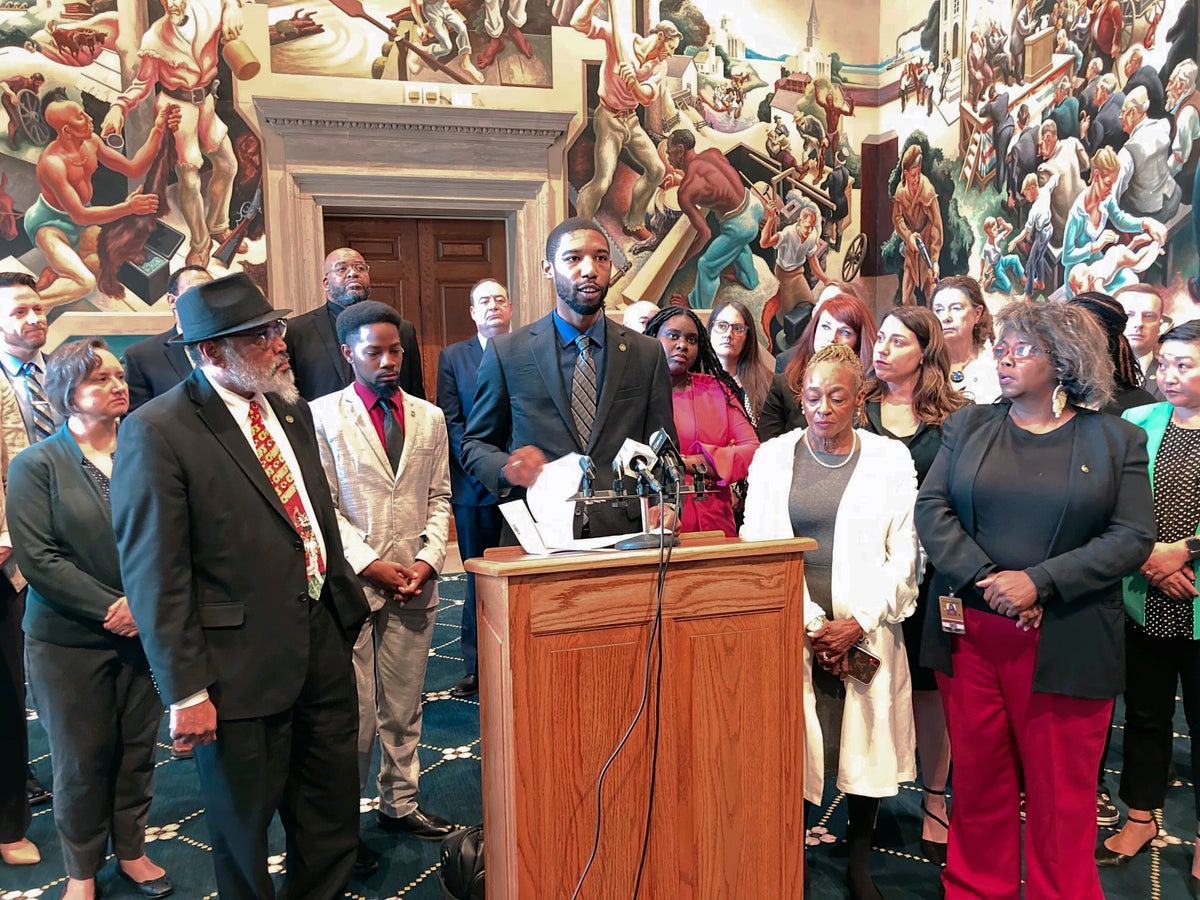
Racial tensions in Mississippi echoed in Missouri Thursday, as Black Democratic lawmakers accused the state's Republican House leadership of racism for shutting down a Black lawmaker's speech and passing a bill that could strip power from the Black woman elected as prosecutor in St. Louis.
The discord in the Missouri House came just days after a similar situation in Mississippi, where Black lawmakers denounced the majority-white, Republican-led Legislature for voting to take power away from local leaders in the predominantly Black city of Jackson.
Like in Mississippi, Missouri's legislature has a largely white Republican majority. Most of the Black lawmakers represent the state's two largest urban areas of St. Louis and Kansas City.
Missouri Republicans have made anti-crime legislation a priority this session, often highlighting high crime rates in St. Louis as an impetus. The House passed legislation by a 109-35 vote that would allow Republican Gov. Mike Parson to appoint a special prosecutor to handle violent crimes in areas with high homicide rates, such as St. Louis. The bill also would expand mandatory minimum sentences for persistent felony offenders, among other things.
State Rep. Kevin Windham, a Black Democrat from St. Louis County, was reading aloud a news article about the Mississippi situation during the House debate when some white Republican lawmakers objected that his speech had nothing to do with the Missouri legislation.
House Speaker Dean Plocher ruled Windham out of order, halting his speech. Windham's microphone was turned off. House Majority Leader Jon Patterson then made a motion to shut off debate on the bill, which the Republican majority voted to do — leaving other Black Democrats standing without getting a turn to speak.
Black lawmakers were outraged.
“It’s racist to not allow him to speak,” Rep. Marlene Terry, a St. Louis County Democrat who is chair of the Missouri Black Legislative Caucus, told reporters after the debate.
Terry said she was calling on Black leaders and community activists to come to the Capitol.
“From now on there’s no more peaceful – no more peaceful – it’s going to be actions," Terry said. "We’re going to let them know that we are here to be heard.”
Patterson defended his role in halting the debate, saying the “conversation was devolving and may have gotten worse.”
“I don't discount any of the experiences that our Black lawmakers have had, or the white lawmakers,” Patterson told The Associated Press. “I can guarantee this — it did not play a role in me deciding that it was time to have a vote on the bill."
In Mississippi, tensions were stirred Tuesday by two separate votes. The Mississippi Senate voted to create a regional board to eventually take control of Jackson’s struggling water system, which is now overseen by a federally appointed administrator. Then the House voted to create a new court in part of Jackson with judges who would be appointed rather than elected.
Democratic Mississippi state Sen. John Horhn said during a Legislative Black Caucus news conference that the actions "amount to a symbolic decapitation of Black elected leadership.”
Missouri's debate on Thursday was relatively brief. But the House had spent several hours debating and amending the bill the previous day. The final vote didn't fall exclusively on racial lines. Among those voting for the bill were a Black Republican lawmaker from suburban St. Louis and two Black Democratic lawmakers from Kansas City. That included Democratic Rep. Mark Sharp, who supported a provision in the bill making it a crime to discharge a firearm with criminal negligence in city limits.
Plocher said passage of the bill — which now heads to the Republican-led Senate — was an exciting step.
“We’re beginning a process to improve Missourians’ lives by cracking down on crime," Plocher said.
The office of St. Louis Circuit Attorney Kim Gardner issued a statement calling the legislation “a political stunt.”
The Rev. Darryl Gray, a St. Louis pastor and a leading racial justice activist, said he and other activists “are discussing ways to challenge this. We are giving serious thought to civil disobedience in Jefferson City.”
Zaki Baruti, leader of the St. Louis-based Universal African People’s Organization, described the effort to strip power from Gardner as “a move against Democracy."
Gardner is the first and only Black circuit attorney elected in St. Louis, and she has pursued a progressive agenda. She stopped prosecuting low-level marijuana crimes, favors diverting first-time, non-violent offenders to community programs instead of jail, and has developed an “exclusion list” of several dozen police officers who are not allowed to bring cases to her office, based in part on concerns of potential racial bias among those officers.
“She represents the hopes and aspirations of the Black community,” Baruti said. He added: “Clearly this is an attack and not just happening here in St. Louis but across America, where when Black people seize key positions of power and do actions that some lawmakers feel that they can’t go along with, they come under tremendous attack."







